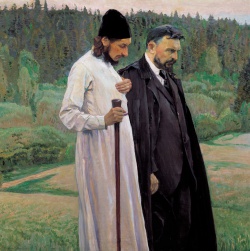Pavel Florensky
 Mikhail Nesterov, Философы [Philosophers], 1917. Florensky and Sergei Bulgakov, painting. | |
| Born |
January 22, 1882 near Yevlakh, Elisabethpol Governorate, Russian Empire (today Azerbaijan) |
|---|---|
| Died |
December 8, 1937 (aged 55) Leningrad, Soviet Union (today St. Petersburg) |
Pavel Florensky (Священник Павел Флоренский, 1882–1937) was a Russian theologian, priest, mathematician, scientist, inventor, and philosopher.
He wrote on art, language, organic chemistry, mysticism, Kant, sculpture, Dostoevsky, Flaubert, Aegean culture, arithmetic, idealism, iconography, electromagnetism, microscopy, carbolic acid, asbestos, Pythagorean numbers, Aleksandr Blok, ecclesiology, and a wide variety of other topics. After the revolution he was one of the few intellectuals with conservative views to be permitted to remain professionally active in the country, at least for a time. His training in science made him useful in the early years of the Soviet Union, when he applied his expertise as an electrical engineer to various public-works projects. In Soviet history, until recently the achievement for which Florensky was perhaps best remembered officially in his own country was his invention in 1927 of a noncoagulating machine oil. [1]
Literature
By Florensky
- in Russian
- Stolp i utverzhdenie istiny, T1 (1) [Столп и утверждение истины], Moscow: Pravda, 1990; T1 (2).
- U vodorazdelov mysli Т.2 [У водоразделов мысли], Moscow: Pravda, 1990.
- Mnimosti v geometrii [Мнимости в геометрии], Moscow: Pomore [Поморье], 1922; repr. Munich: Otto Sagner, 1985, with an introductory essay by Michael Hagemeister; Moscow: Lazyr [Лазурь], 1991, 96 pp. [2]
- Ikonostas. Izbrannye trudy po iskusstvu [Иконостас. Избранные труды по искусству], Moscow: Russkaja kniga, 1993.
- Сочинения в 4-х томах: том 1, Moscow: Мысль, 1994, 797 pp.
- Сочинения в 4-х томах: том 2, Moscow: Мысль, 1996, 877 pp.
- Сочинения в 4-х томах: том 3(1), Moscow: Мысль, 2000, 621 pp.
- Сочинения в 4-х томах: том 3(1), Moscow: Мысль, 2000, 623 pp.
- Сочинения в 4-х томах: том 4, Moscow: Мысль, 1998, 795 pp.
- Istoriya i filosofiya iskusstva [История и философия искусства], Moscow: Mysl [Мысль], 2000.
- Философия культа, Moscow: Мысль, 2004, 685 pp.
- Письма семье из лагерей и тюрем 1933 -1937 гг, Сатисъ, 2004.
- in English
- The Pillar and Ground of the Truth, Princeton University Press, 1997. Introduction.
- Beyond Vision: Essays on the Perception of Art, ed. Nicoletta Misler, Reaktion Books, 2002. [3]
- in Romanian
- Iconostasul, trans. Boris Buzilă, Fundatia Anastasia, 1994.
- Dogmatică şi Dogmatism, trans. Elena Dulgheru, Bucharest: Anastasia, 1998. [4]
- Stâlpul şi Temelia Adevărului. Încercare de teodicee ortodoxă în douăsprezece scrisori, trans. Emil Iordache, Iulian Friptu and Dimitrie Popescu, Iaşi: Polirom, 1999. [5] [6]
On Florensky
- Books
- K.G. Isupova (ed.), P.A. Florensky: Pro et contra, St. Petersburg: Русский Христианский Гуманитарный Институт, 1996, 752 pp. (in Russian)
- Milan Zust, À la recherche de la vérité vivante. L’expérience religieuse de Pavel A. Florenskij (1882-1937), Rome, Lipa, 2002, 394 pp. (in French). Review.
- Avril Pyman, Pavel Florensky: A Quiet Genius: The Tragic and Extraordinary Life of Russia s Unknown Da Vinci, New York: Continuum, 2010, 304 pp. Review. [7]
- Papers, Book chapters, Articles, Blog posts
- Leonid Sabaneeff, Pavel Florensky-Priest, Scientist, and Mystic, Russian Review 20:4 (October 1961), pp 312-325.
- Kirill Sokolov, Avril Pyman, Father Pavel Florensky and Vladimir Favorsky: Mutual Insights into the Perception of Space, Leonardo 22:2 (1989), pp 237-244.
- Steven Cassedy, "Pavel Florensky", in Flight from Eden: The Origins of Modern Literary Criticism and Theory, University of California Press, 1990, pp 114-120.
- Nicoletta Misler, "Toward an Exact Aesthetics: Pavel Florensky and the Russian Academy of Artistic Sciences", in Laboratory of Dreams: The Russian Avant-garde and Cultural Experiment, eds. John E. Bowlt and Olga Matich, Stanford University Press, 1996, pp 118-132.
- Stephen C. Hutchings, "Making Sense of the Sensual in Pavel Florenskii's Aesthetics: The Dialectics of Finite Being", Slavic Review 58:1 (Spring 1999), pp 96-116.
- Antonio Maccioni, "Pavel Aleksandrovič Florenskij. Note in margine all'ultima ricezione italiana", eSamizdat V:1-2 (2007), pp 471-478. (in Italian)
- Vasile Cristescu, "The Reverse Perspective in the Orthodox Iconography According to P. Florenski: A Dogmatic Perspective", European Journal of Science and Theology, 5:1 (March 2009), pp 41-50.
- Steven Cassedy, "Pavel Florenskii's Trinitarian Humanism", in A History of Russian Philosophy 1830–1930, 2010, pp 190-204. [8]
- Ross Wolfe, "The aesthetics of Russian Orthodox Church architecture: A philosophical, historical, and critical investigation", The Charnel-House blog, 30 August 2010.
- Clemena Antonova, "Visuality Among Cubism, Iconography, and Theosophy: Pavel Florensky's Theory of Iconic Space", Museum of Russian Icons, February 2012.
- Theses
- Elizabeth Cooper English, "Arkhitektura i mnimosti": The origins of Soviet avant-garde rationalist architecture in the Russian mystical -philosophical and mathematical intellectual tradition, University of Pennsylvania, 2000. [9]